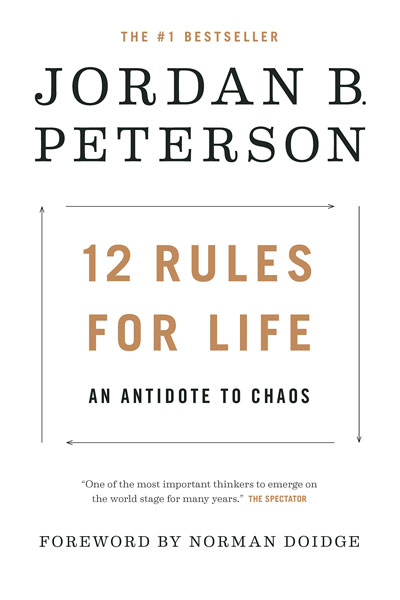

This article is an excerpt from the Shortform summary of "12 Rules for Life" by Jordan Peterson. Shortform has the world's best summaries of books you should be reading.
Like this article? Sign up for a free trial here .
In 12 Rules for Life, Rule #4 is “Compare Yourself To Who You Were Yesterday, Not To Who Someone Else Is Today.” What does this mean? Why is it so bad to compare yourself to other people?
According to Jordan Peterson’s Rule 4, the only person you should compare yourself to is yourself. As long as you’re getting better day by day, then you should be happy with yourself. Learn more about Rule 4 below.
Overview of Jordan Peterson’s Rule 4
With today’s mass media, there is always someone out there better than you in everything you do. Your career seems boring, you wish your friends were more exciting and more attractive, you’re fatter than your co-workers, and you’re bad at sports. How good can you feel as prime minister of Canada, when someone else is the President of the United States?
As explained in Rule 1, this wasn’t the natural case for hundreds of thousands of years. We used to live in small tribes of hundreds. Chances were you were good at something, and you got serotonin signals from people acknowledging you were good. Now you might never get positive feedback, while you get tons of negative feedback about people who seem better than you.
If you compare yourself to other people, you’re using an unfairly harsh standard.
Bad Solutions to High Standards
According to 12 Rules for Life, people react to high standards in a variety of ways. Many of them are bad.
The solution isn’t to simply reject all standards. Standards are useful to guarantee a level of quality (like building bridges), and to keep pushing us up to better things. Being unsatisfied with your present world is a useful push to improve your situation. But setting unrealistically high standards can also lead to crushing, chronic self-criticism, where you feel you aren’t capable of doing anything.
The solution also isn’t nihilism and hopelessness. Don’t think, “there will always be people better than me, so what’s the point? The world’s going to end in a billion years if not a million – why does what I do matter?” Peterson argues that this is a cheap trick – pick a time frame long enough, and nothing matters. This is an unreliable, worthlessly simplistic way to look at life.
The solution also isn’t to protect people from the idea that they have ways to improve, and that standards do exist. Throughout the 20th century, American culture took on the delusionally positive thinking of constant praise for kids. Trophies for everyone, you’re all special and capable of everything you want to do. This merely blinds people to the truth, and when reality hits, people are unprepared to deal with it.
Set Your Own Goals
Instead of judging yourself by other people’s yardsticks, you need to set your own. You need a total reworking of your goals, starting with understanding yourself as though you were a stranger. This is how you start to “Compare Yourself To Who You Were Yesterday.”
There are 3 steps:
Step 1: Take a broader view of your existence and of other people.
You’ve likely identified a single, arbitrary dimension as THE single most important thing to achieve – like money, fame, or status – and you feel miserable that you don’t have it.
But according to Jordan Peterson’s Rule 4, your existence is multidimensional. You have a lot of components to your existence – family, friends, personal projects, hobbies. Judge your success across all the games you play. Your existence is so unique and customized to you, that you can’t easily compare yourself to any other individual.
Furthermore, there isn’t a binary condition of “success” vs “failure.” There are many gradations in between. What matters is whether you can get better, not whether you can achieve binary success.
Finally, you’re likely only seeing the highlight reel from other people. They don’t expose their deep problems and failing. You’re likely overvaluing what you don’t have and undervaluing what you do. Even the very people you envy might secretly envy you, in ways you’re not aware.
Step 2: Drill deeply into your discontent and understand yourself.
The first absolute requirement: you need to genuinely want your life to improve. You can’t fool yourself. If you don’t want this, you won’t be able to improve.
- (Shortform suggestion: If you’re stuck here, then think more about why you don’t want to improve. Recall from Rule 2 that you might have self-loathing and believe you don’t deserve to improve. If so, treat yourself like you would another person, and be lighter in your judgment of yourself.)
Next, you’re likely discontent about not having something (like money, a particular job, an achievement). Drill into your discontent and transform it. What do you want? Why do you feel this way? (Shortform suggestion: Keep asking why until you can’t answer it anymore. Then you’ll hit the foundation of why you feel this way.)
As you question yourself, you may realize that there are multiple conflicting desires at play. List them all out, realize the conflict between them, then prioritize them into a list.
Is the subject of your discontent within your control? If not, look somewhere else. Find something you can fix.
According to Jordan Peterson’s Rule 4, you may find some of your desires to be rooted in bitterness and resentment. How do you transform your goal so that you remove bitterness and resentment? What if you didn’t have to improve yourself at other people’s expense? What if you could achieve your goal, while also making your friends, even your enemies happier?
Finally, realize you may have to give up old goals to find a new direction.
An Example of Rule 4
Shortform note: These are abstract pointers, so let’s work through an example in more detail than the book does. Say you really want your boss’s job. You’re miserable day to day because you can’t stand to see your incompetent boss doing a job that should be yours. You believe that if only you got your boss’s job, you’d be happy forever.
Then keep asking why you want your boss’s job. You may find a surprising variety of desires at play:
- You want better status. Why?
- Because you enjoy when other people see you with higher social status.
- You want to make more money. Why?
- Because it allows you to better take care of your family.
- Because money is the yardstick by which you measure people’s value.
- You want fairness. More capable people should be rewarded accordingly, and it’s unfair for less deserving people to get more.
- You want to do good work with higher responsibility. Why?
- Because you want to serve the world, and having a higher title lets you accomplish more.
- You dislike your boss as a person. You want to see him fail in return for all that he’s taken from you.
That’s a lot of desires, and it’s much more complicated than “I want my boss’s job.” You can only produce a list like this by thinking deeply.
Now that you’ve listed them, you can then prioritize which ones are most important to you.
Then you can notice the conflicts between them:
- You want to serve the world, and you see yourself as a good person. But at the same time, you want to see your boss fail. Could you define a new goal, that allows you to avoid this bitterness?
Finally, what can you do to achieve your most important desires?
- If getting your boss’s job is within your control and you still desire it, how could you do so?
- If not, how could you achieve all your other goals another way? Maybe by applying to a new role within the company, or a new job?
While Peterson doesn’t go into his example anywhere near this length, we believe it correctly applies his thinking.
While you do this exercise, realize that you’re blind and can’t see yourself honestly. You’re blind to what goals you really want because you’re focusing on something very narrow. You’ve obsessed over a narrow goal for a long time, so it’ll take an adjustment period to see the bigger picture.
- In general, you can’t even understand fully how your brain works, since it’s been shaped by millions of years of development that you’re not aware of.
- Analogy to vision: our retinas have a narrow central section with high acuity (the fovea) – everything else is blurred. Similarly in life, you’re focusing on something very narrow and ignoring everything else of value.
Step 3: Transform your goal into something achievable.
You might have big goals, and that’s good. But break it down to something tractable you can do today. This makes it easier to “Compare Yourself To Who You Were Yesterday.” Then you’ll start building ever upwards.
Aim small, then grow your ambition.
- What one thing in your life can you fix right now?
- Let things in your life at the end of the day be a little better than they were this morning.
- Do that for a month, then three months, then three years, and now you’re aiming for the stars.
Negotiate with yourself and honor your commitments.
- Pretend you’re working for your own internal boss. After you finish, the boss complains it’s not good enough and asks for 10x the work. Would you work for a tyrant like this?
- No – make yourself a deal (eg reward for doing something), and feel good about it after you finish.
Continue to pay attention.
- Once you start looking at your new goal, you’ll start seeing new things you were blind to before – new information, opportunities.
The Results of Applying Jordan Peterson’s Rule 4
Once you put this into practice, you’ll improve how you feel about your self-worth and comparing yourself to other people.
- You don’t get jealous of someone else’s success, because you know life has a lot of factors, everyone’s playing their own game, and that person might not have it better than you.
- You don’t get frustrated with your lack of immediate success, since you know you need to make small steps and be patient.
- You’re less obsessed with other people’s success, because you have more than enough to do yourself.
Ultimately, Peterson believes the answer to nihilism is the “essential goodness of Being.” This comes from aiming for a meaningful goal that improves the lives of people and for a long time. There is beauty to create and order to make in the world. There’s evil to defeat and misery to soothe.
———End of Preview———

Like what you just read? Read the rest of the world's best summary of "12 Rules for Life" at Shortform . Learn the book's critical concepts in 20 minutes or less .
Here's what you'll find in our full 12 Rules for Life summary :
- Why standing up straight will make people treat you differently
- How to find meaning in your life and work
- Why you're lying to yourself without realizing it






